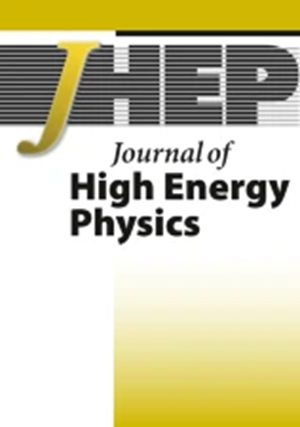全局 SU(5) F 理论模型中不存在可观测的质子衰变
IF 5.5
1区 物理与天体物理
Q1 PHYSICS, PARTICLES & FIELDS
引用次数: 0
摘要
我们从一个被打破成 SU(5)gauge × U(1)X 和一个孪生 SU(5)gauge × U(1)X 的 E8 × E8 异质模型开始,其中一个 SU(5) 及其谱被确定为可见扇面,而另一个可以被确定为隐藏的孪生扇面。在这两种情况下,我们都得到了威尔逊线对称性破缺后的最小超对称标准模型(MSSM)谱,它由低能量R-奇偶性和{\mathbb{Z}}_4^R \)对称性增强。我们认为,在这个模型中不会有任何可观测到的质子衰变。本文章由计算机程序翻译,如有差异,请以英文原文为准。
The absence of observable proton decay in a global SU(5) F-theory model
We begin with an E8 × E8 Heterotic model broken to an SU(5)gauge × U(1)X and a twin SU(5)gauge × U(1)X, where one SU(5) and its spectrum is identified as the visible sector while the other can be identified as a hidden twin sector. In both cases we obtain the minimal supersymmetric standard model (MSSM) spectrum after Wilson-line symmetry-breaking enhanced by a low energy R-parity and \( {\mathbb{Z}}_4^R \) symmetry. We argue that there will not be any observable proton decay in this model.
求助全文
通过发布文献求助,成功后即可免费获取论文全文。
去求助
来源期刊

Journal of High Energy Physics
PHYSICS, PARTICLES & FIELDS-
CiteScore
10.00
自引率
46.30%
发文量
2107
审稿时长
12 weeks
期刊介绍:
The aim of the Journal of High Energy Physics (JHEP) is to ensure fast and efficient online publication tools to the scientific community, while keeping that community in charge of every aspect of the peer-review and publication process in order to ensure the highest quality standards in the journal.
Consequently, the Advisory and Editorial Boards, composed of distinguished, active scientists in the field, jointly establish with the Scientific Director the journal''s scientific policy and ensure the scientific quality of accepted articles.
JHEP presently encompasses the following areas of theoretical and experimental physics:
Collider Physics
Underground and Large Array Physics
Quantum Field Theory
Gauge Field Theories
Symmetries
String and Brane Theory
General Relativity and Gravitation
Supersymmetry
Mathematical Methods of Physics
Mostly Solvable Models
Astroparticles
Statistical Field Theories
Mostly Weak Interactions
Mostly Strong Interactions
Quantum Field Theory (phenomenology)
Strings and Branes
Phenomenological Aspects of Supersymmetry
Mostly Strong Interactions (phenomenology).
 求助内容:
求助内容: 应助结果提醒方式:
应助结果提醒方式:


